What app is best for learning Japanese? MosaLingua, of course! Yes, the time has come that you can start learning this fascinating language with the MosaLingua Japanese language app! Our team has worked hard to bring you a simple yet efficient tool to help you study and reach your goals. Today, I’d like to introduce our method and give more details about some of the contents of the app.
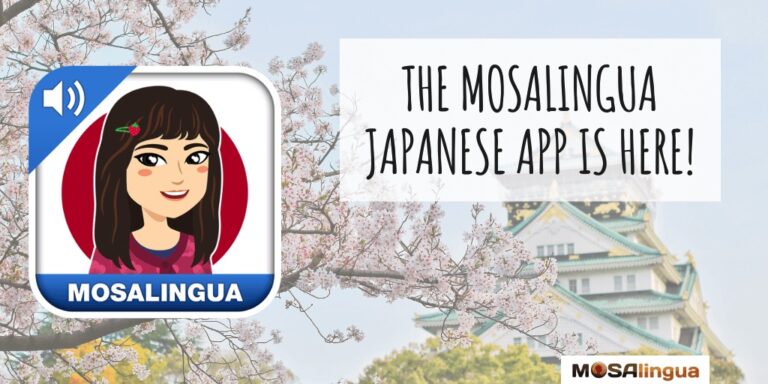
Download the MosaLingua App to Learn Japanese
If you’re ready to get started right away, download the app here:
Start improving your Japanese today
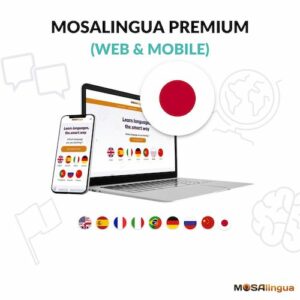
Good news: we can help!
More good news: you can get started for free! With your free trial, you can test drive the most effective way to learn Japanese for the next 15 days!
Vocabulary flashcards, videos with subtitles, audiobooks, articles adapted to your level—with MosaLingua Premium (Web & Mobile), you’ll have access to all this and more. Get started right now. It’s free—and risk-free—to try!
Why Choose Our Brand-New Japanese App?
What sets the MosaLingua Japanese app apart from all the other language apps out there?
As you may know, our central approach is to teach languages through their most common and useful words and phrases. That’s why our app offers 2,000 different flashcards to help you memorize words and expressions you’ll need in a variety of contexts: daily life, work, travel, exams, etc. You also have the ability to customize your learning experience according to your level and needs.
Peek inside…
Here’s an example of one of our flashcards. This one is from the category “The Basics” > “Polite Phrases” > “Thank you.” You’ll see that the card shows the expression written in Japanese (kanji and kana), the English translation, and the transcription in romanji (Latin characters).
Here, the “Explore” section allows you to look at and listen to all the cards in the “Polite Phrases” category: you’ll see the expression written in Japanese (kanji and kana), the English translation, and an audio recording of the Japanese pronunciation.
A proven method…
Our method is based on a foundation of cognitive science and psychology. One of the main principles is the Spaced Repetition System. The results speak for themselves – this method makes it possible for any learner to gain lasting and durable knowledge by simply focusing on the most useful material.
This system will help you to review words and expressions on a regular basis and will prompt you to reflect upon your degree of understanding.
The more you struggle with a word, the more often it will appear in your revisions. This will help you anchor difficult words in your memory over the long term.
And on the flip side, words that come easily to you (or that you’ve already put in the work to memorize) will appear less often, making room for new words and expressions.
It’s just up to you to find the right time during your day to start practicing and memorizing!
…adapted for each language
Even if the basics of our approach remain the same, each language offers its own challenges. Changes have to be made to adapt the system to fit the unique qualities of the language. This is especially true for languages that don’t use the Latin alphabet (like Russian, Mandarin Chinese, and Japanese). It’s no surprise that learning Spanish and learning Japanese are two very different experiences for an English speaker.
Behind each language course that we offer is a unique pedagogic strategy. Efficiency is always an important goal for us. For example, after a brief introduction to Japanese vocabulary terms, we ask you if you have any experience with pronunciation or the kana system. We can then propose a customized learning plan based on your answer.
Our language-learning “Dream Team”
All of our lessons have been designed and implemented by our own teaching team. The Japanese team, for example, includes an instructor who is a native Japanese speaker, a native-speaking translator, and two language experts who have studied Japanese.
In fact, in all cases, we think it’s absolutely necessary that our material be developed by a combination of native speakers and people who have experienced learning the language. This helps target specific needs and challenges that learners might face.
What Does the MosaLingua Japanese Language App Offer?
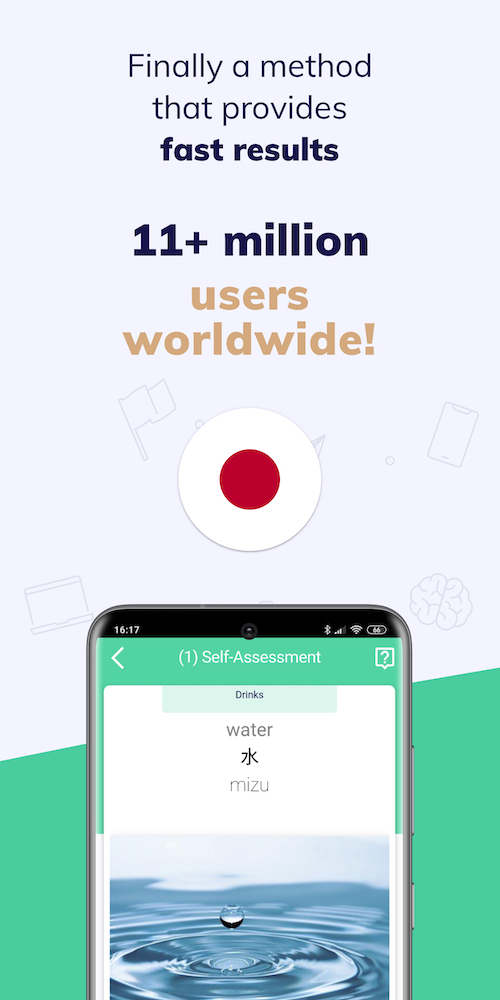
- Lessons to explore Japanese pronunciation
- An introduction to Japanese writing systems (hiragana and katakana to start)
- Vocabulary grouped by category, and useful phrases to help you start communicating quickly
- Transcriptions of audio samples to help improve your pronunciation
- 20 basic Japanese grammar lessons
What else?
The MosaLingua Japanese language app will surprise you with the variety of content, advice, and other learning tips it offers. For example, you’ll find:
- More than 2,000 flashcards with vocabulary words and useful phrases (written + audio + transcription in rōmaji).
- 14 main categories and more than 100 sub-categories, so you can decide exactly what you want to learn. These include language basics, tourism, hobbies, socializing, small talk, etc.
- Many bonus flashcards about various aspects of Japanese culture. These are a great way to stay motivated to keep learning!
Who Is Our Japanese Language App For?
Our Japanese app is for anyone and everyone who wants to dive into learning this language. It’s especially designed for two different types of users:
- Beginners. Are you planning a trip to Japan and want to make sure you can navigate and talk with locals? Our app provides the necessary vocabulary and information to get by during your trip.
- False beginners. For those who already know a little bit of the language, and are looking to polish and refine their skills. Our app will help you enrich your vocabulary and learn the most useful phrases to help you improve your spoken language.
A focus on speaking rather than writing
As mentioned above, we have a series of lessons that will introduce you to Japanese writing systems. The app also includes cards that teach basic Japanese characters (kana – hiragana & katakana). The SRS learning method will help you learn and memorize all of these.
As far as kanji (Chinese ideograms) are concerned, they appear on cards with a brief explanation – their origin, function, use, etc. We made the decision to not dive too deep into kanji in our app, simply so you can focus more on oral expression, and then later turn to written expression.
Learn Japanese whenever and wherever you want
✨ The MosaLingua Japanese language app was developed to help people learn Japanese at any time, in any place, and at any level.
Sitting in a waiting room? On your lunch break? Did you just wake up and want to kick start your day with a little studying? Take five minutes to learn a few new vocabulary words! Whether you’re sitting on the bus, at your desk, or on your couch, you can always learn a little vocabulary. Find the time and place that work best for you, and start learning.
🌟 Another advantage of using MosaLingua? It works offline. You can study without an internet connection, so you can access the app even while you’re out of the country! Perfect for vocabulary emergencies!
💫 And to help you get the most for your efforts, the app also has a hands-free mode. It’s great for studying on the go or before bed.
⭐️ Plus, you can access everything you’ve learned, your progress charts, and more on all your devices thanks to progress syncing.
We could talk about all the benefits of our apps for days, but we think it’s best if you get our free trial and see for yourself if MosaLingua is right for you!
Are you ready to immerse yourself in Japanese and dive into an amazing linguistic adventure?
Next Steps
If you found this article interesting, you might also like:
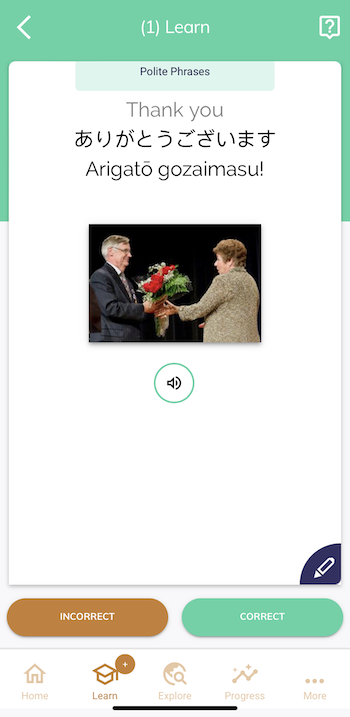
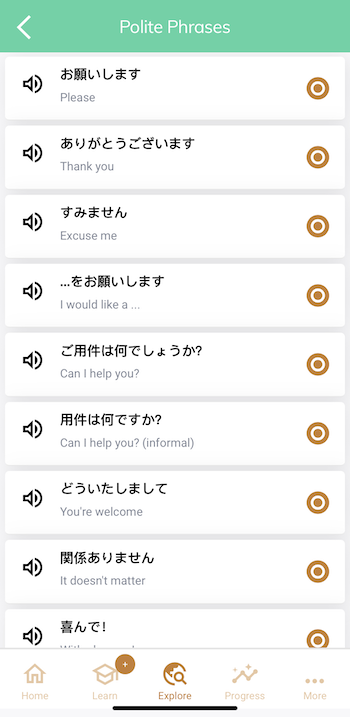




Comments